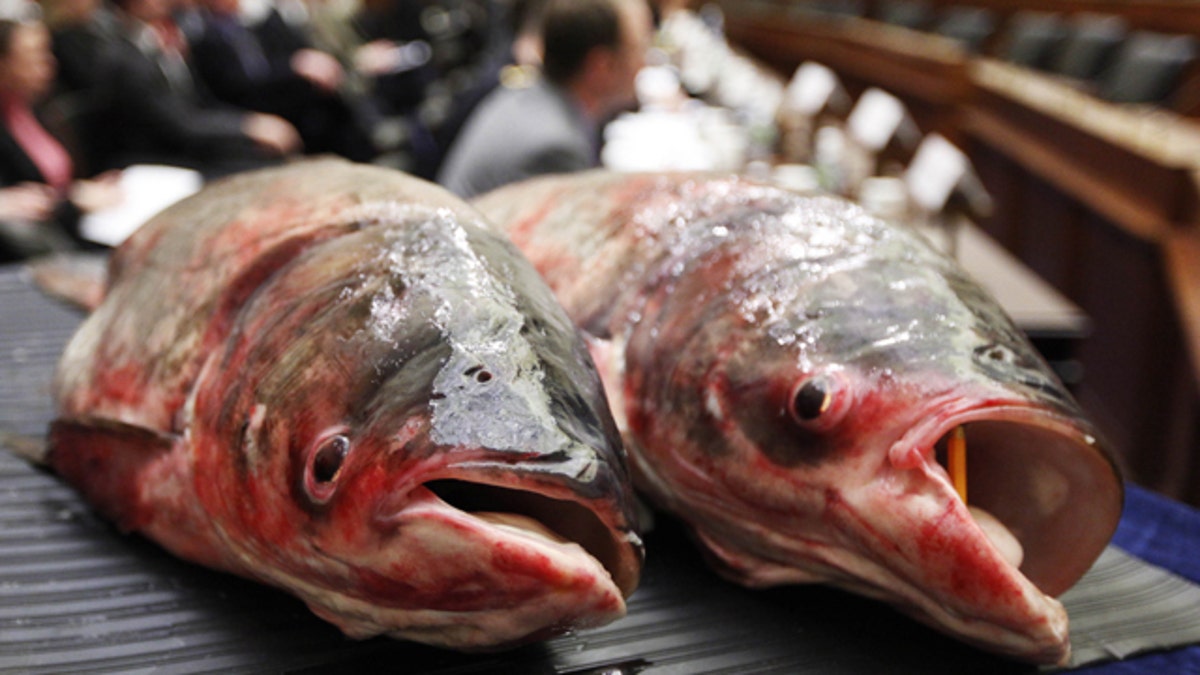
State and federal agencies are at war with the Asian carp, an invasive fish species that can grow up to five feet and weigh more than a hundred pounds. (AP)
TRAVERSE CITY, Mich. – Five states asked the U.S. Supreme Court on Wednesday to hear their plea for quicker federal action to prevent Asian carp and other invasive species from moving between the Great Lakes and Mississippi river watersheds.
Michigan Attorney Bill Schuette said he had filed a petition with the nation's highest court to review a ruling by the 7th U.S. Circuit Court of Appeals in Chicago, which in August refused to order the U.S. Army Corps of Engineers to speed up a study of how to block aquatic pathways between the two water systems.
The Corps has promised to complete its study in 2015, but Michigan and four other states in the Great Lakes region -- Minnesota, Ohio, Pennsylvania and Wisconsin -- say that's too slow.
Large, voracious bighead and silver carp have infested the Mississippi and tributary rivers that are connected by other waterways to Lake Michigan in the Chicago area. If they become established in the lakes, some experts say the Asian invaders could gobble enough plankton to destabilize the food web and damage the region's $7 billion fishing industry.
"Time is running out for the Great Lakes, and we can't afford to wait years before the federal government takes meaningful action," Schuette said.
The Chicago waterways also have been a pathway for other exotic species such as the zebra mussel and round goby, which were brought to the Great Lakes in ballast tanks of oceangoing vessels and have spread to other waters.
The five states are suing the Army Corps and Chicago municipal water district in federal district court over their operation of the waterways. The case has not come to trial. In the meantime, the states requested a court order for interim measures including a faster timetable for the study and installation of block nets in the Little Calumet and Grand Calumet rivers, both of which are linked to the Mississippi drainage basin and flow into Lake Michigan.
Their proposal was rejected by the district and appeals courts.
The U.S. Department of Justice, which represents the Army Corps, is reviewing the states' petition to the Supreme Court, said spokesman Wyn Hornbuckle, who declined further comment. Army Corps officials have repeatedly said they could not speed up their study because it is a comprehensive look at all potential pathways between the two watersheds.
The Supreme Court has denied two previous requests from Michigan to order closure of Chicago-area navigational locks that could provide doorways to Lake Michigan for the carp.
In their new petition, the five states said the high court should consider their case because the appeals panel, despite its ruling against them, acknowledged their lawsuit had shown there was a good chance the unwanted carp would reach Lake Michigan.
Mark Biel, chairman of an Illinois business coalition called UnLock Our Jobs, said the appeals panel also found that Michigan's proposals would harm communities that use the Chicago waterway system.
"It's time for Michigan to accept that these fish won't be stopped in a courtroom," Biel said. "More legal action continues to waste valuable time and money that should be invested in comprehensive prevention efforts to bring the rest of the region up to par with Illinois control efforts."
The Obama administration has pledged more than $120 million for a wide-ranging strategy to keep the carp out of the lakes. The Army Corps contends an electric barrier network in the Chicago Sanitary and Ship Canal about 37 miles by water from Lake Michigan is keeping them in check for now.
But scientists have detected Asian carp DNA in dozens of water samples taken beyond the barrier, although just one actual carp has been found there. They say the DNA probably signals the presence of live carp, although it's unclear how many.
Recent sampling also has turned up Asian carp DNA in the St. Croix River between Minnesota and Wisconsin and the stretch of the Mississippi River that flows past Minneapolis and St. Paul.

